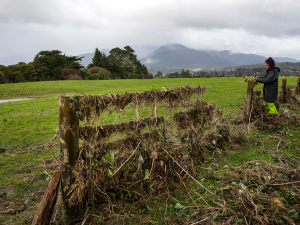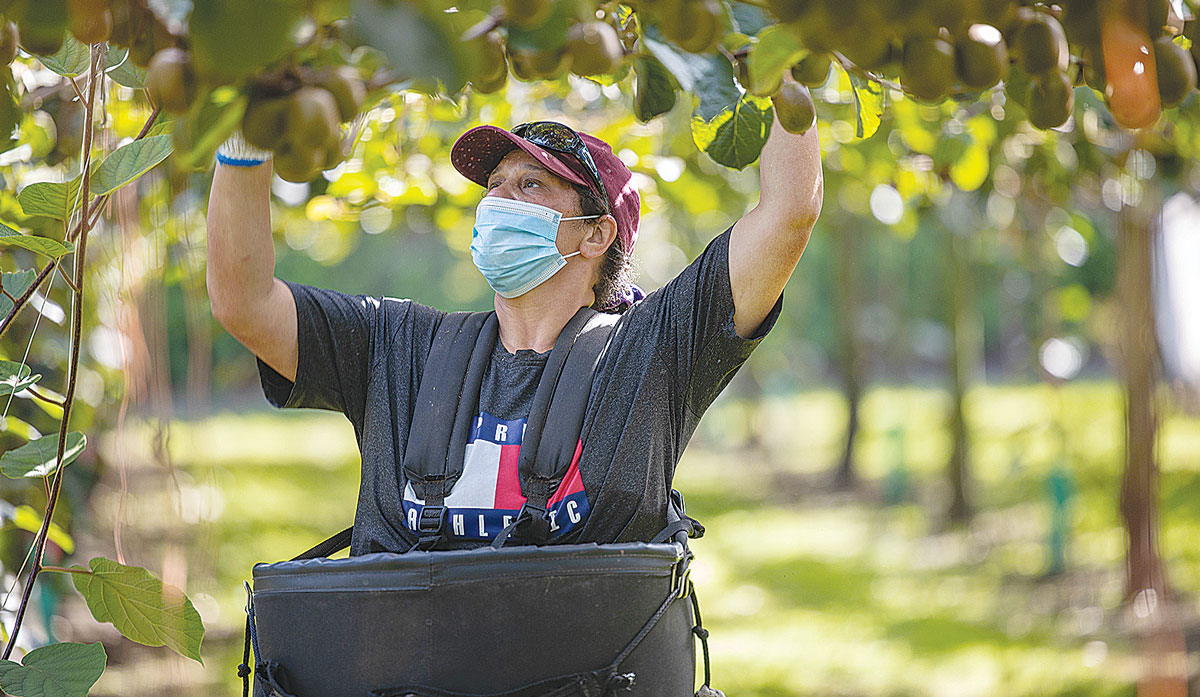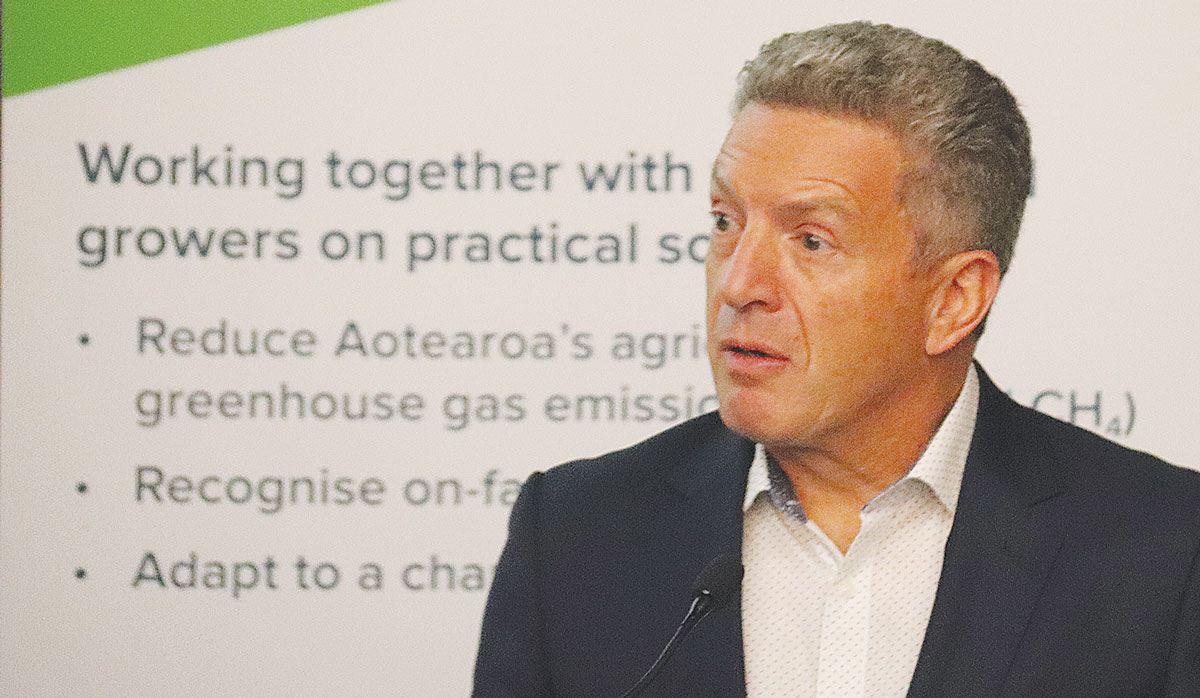Editorial: Goodbye 2024
OPINION: In two weeks we'll bid farewell to 2024. Dubbed by some as the toughest season in a generation, many farmers would be happy to put the year behind them.
 The West Coast was again hit by flooding early in the year. Photo Credit: Jules Anderson Photography.
The West Coast was again hit by flooding early in the year. Photo Credit: Jules Anderson Photography.
As 2022 draws to a close, many farmers will be looking for a fresh start in 2023. Many rural people feel that the past year was difficult one where they were constantly under the gun. In this retrospective, Leo Argent highlights some of the highs and lows of another year in the rural sector.
January
Meat and horticulture industries push for access to qualified overseas personnel to meet staff shortages as businesses cannot operate at full capacity, resulting in lost profits.
Despite some holdouts, Covid-19 vaccination rollouts are in full swing with most rural workers vaccinated.
Numerous first quarter reports show positive outlooks for the primary sector, particularly beef and dairy. However, with the war in Ukraine affecting supply lines, inflation, and increasingly unpopular government policies it is unlikely that the report's findings are still accurate.
February
Despite other gatherings being restricted due to the Omicron outbreak, HWEN consultations go ahead, with Beef+Lamb NZ (BLNZ) and DairyNZ saying that the Government would otherwise implement the ETS without consultation with farmers; come the release of the final plan in October, many find that is exactly what happened.
Shipping delays continue due to backlog from Covid-19 and lack of personnel.
Despite disruptions due to Covid-19, meat prices hit a record high of $10b in 2021.
Russia invades Ukraine, sparking an ongoing war, wreaking havoc on supply lines and causing numerous knock-on effects worldwide.
Flooding on the West Coast causes significant damage to communities. Following on from last year's July floods, this creates significant pressure to future proof and to recoup losses.
March
Overseas workers entering New Zealand are now only required to self-isolate rather than go through MIQ, allowing more people to enter the country and alleviating some of the worst staff shortage problems.
Three honey businesses across New Zealand merge together to form The Mānuka Collective. In conjunction with a reduction in hive numbers this consolidation of resources seves to boost the quality and prestige of mānuka honey.
Omicron prevents many field days and shows throughout the country.
The UK and NZ sign free trade agreements, removing tariffs on beef and lamb and boosting flagging dairy exports; July sees another FTA signed with the EU.
 |
|---|
|
An ongoing shortage of overseas workers left many farming and horticultural enterprises struggling to get crops harvested this year. |
With diesel costs threatening the regions' profitability, the Chatham Islands seek new, sustainable methods of producing electricity, such as wind and solar.
April
The Land Transport Amendment Act 2022 comes into effect giving a rebate to electric/hybrid vehicles and imposing extra tax on vehicles that don't meet the new standards; with most, if not all, utes integral to farm operations falling into the latter category, this results in the derogatory naming of "the ute tax".
Extreme weather events batter the country, with storms and flooding on the North Island's East Coast contrasted with drought in Southland.
Covid-19 outbreaks in China cause major disruptions to international supply lines. The Chinese government aims for a zero Covid strategy that will further disrupt business and trade throughout the year.
 |
|---|
|
April saw the introduction of the much-hated 'ute tax'. |
The New Zealand Meat Board celebrates its 100th anniversary, with chief executive Sam McIvor saying that the board's responsibilities will now include administering FTA quotas with the UK.
May
After reports emerge of abusive behaviour and practices by certain employers in the RSE scheme, Damien O'Connor releases a statement condemning the ill-treatment of Pacific workers by "shoddy operators".
A new welfare code for pigs draws harsh criticism from those in the pork sector who say, while well intentioned, it will instead lead to thousands more piglet deaths and bankrupt pig farmers - who had little input on the proposed changes.
June
A Queenstown Angus bull sells for $81,000 - the top price of the bull season and the second highest price for a bull in South Island history.
HWEN submits its farm level emissions scheme to the Government.
 |
|---|
|
In June, the HWEN partners submitted their proposal for managing on farm emissions to Government. |
Despite uncertainties as to the finished plan, B+LNZ and DairyNZ tentatively put their support behind the submission.
National Fieldays is postponed from its usual June dates due to uncertainties around Covid and instead scheduled to be held in early December.
July
Hauora Taiwhenua Rural Health Network is launched in Wellington, consolidating nine previous groups into a larger, unified organisation.
Federated Farmers suggests the Government extends the first home withdrawal scheme from Kiwisaver to cover farms and make it easier for sharemilkers to purchase homes.
Biotechnology company Pictor Ltd unveils a new diagnostic test for Johne's Disease, claimed to be able to save the dairy industry up to $90 million a year in lost production.
Government and industry bodies are on the lookout for foot-and-mouth disease after isolated cases are found in New Zealand and encourage vigilant NAIT and traceability compliance.
The wettest July in NZ history. Numerous crops are damaged and livestock management is made more difficult by muddy paddocks.
August
A new FTA agreement with the EU is agreed that removes tariffs on 91% of goods sent to the EU - New Zealand's fourth-largest export market - including kiwifruit, wine, onions, and seafood - increasing to 97% within seven years. While the Government touted the agreement as a big political win, with big wins for some agriculture and horticulture groups, the meat and dairy sectors were not overly happy with the deal.
Under the new EU FTA, NZ claims exclusive rights to the name mānuka honey. Combined with March's formation of The Mānuka Collective this brings NZ honey's prestige to new heights.
Government announces $1.6 million of funding over five years supporting secondary school agriculture and hort sciences.
September
Massey University announces, with government funding, the country's largest regenerative agriculture trial over the next 7 years.
Silver Fern Farms says that with a new transport management system they will be reducing travel kilometres, saving fuel costs and improving animal welfare.
Government announces new regulations to protect land used for fruit and vegetables - a rare moment of harmony between government and industry in a fractious year.
October
Despite opposition from MPI and farmers regarding the economic losses, the Government says live cattle exports are to be banned, starting in April 2023.
ASB gifts a farm worth $150m to Mount Albert Grammar School for farming education.
The Government announces new funding initiatives for the chronically understaffed rural health community.
November
Te Pae Tata interim health plan is released; while rural communities are able to determine their geographical areas as localities, there is disappointment that 'rural' is not named as a pirority population.
Rural News reports on increasing costs, adverse climate, short staffing and burnout driving many farmers to retire or consider retiring.
After multiple delays, new winter grazing regulations come into effect this month, despite discontent from industry bodies as to the difficulties of acquiring resource consents in the new regulations and alternate pathways.
Agrisea NZ has appointed Craig Hudson as it's new chief growth officer.
State farmer Landcorp, trading as Pamu, is a forecasting a full-year net profit of around $100 million.
Tony Aitken, chief executive of Ruralco, has been awarded the Excellence in Business Leadership Award at the ANZ Business of the Year Awards.
Global trade has been thrown into another bout of uncertainty following the overnight ruling by US Supreme Court, striking down President Donald Trump's decision to impose additional tariffs on trading partners.
Controls on the movement of fruit and vegetables in the Auckland suburb of Mt Roskill have been lifted.
Fonterra farmer shareholders and unit holders are in line for another payment in April.

OPINION: Here w go: the election date is set for November 7 and the politicians are out of the gate…
OPINION: ECan data was released a few days ago showing Canterbury farmers have made “giant strides on environmental performance”.